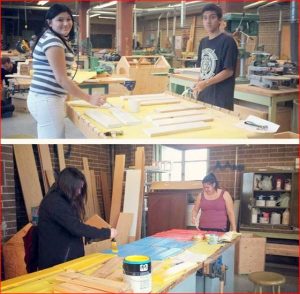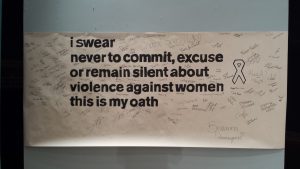
Two teachers at Scott Collegiate, Alumna Tamara Smith (Ryba) and Alumnus Ian Temple received overwhelming support and engagement for the Angels Corner project they initiated at Scott Collegiate.
While travelling in the Maritime provinces in the summer of 2014, Smith was moved by an Angels Corner she came across in St. John’s, an installation to commemorate female victims of violence, intended to raise awareness about this important and ongoing issue. The idea originated in Iqaluit, Nunavut a few years ago as the Angel Street Project and has since been taken up across the country , with Angel streets, squares, corners, crescents, and even bridges being dedicated to honour and remember female victims of violence.
Earlier in 2014, Temple and Smith had been approached to by Scott Collegiate’s administration, Shannon Fayant (Principal) and Chris Beingessner (Vice Principal), about co-teaching a project-based course in the fall of 2014. The course would integrate curricular outcomes from ELA A10, Construction 10, and Math 10 (Foundations and Pre-Calculus). They were encouraged to engage the community through the project.
When Smith saw the Angel Corner, she knew it would be perfect for the course. “I was in downtown St. John’s, Newfoundland when I noticed their Angels Corner, a very visible display on the corner of Prescott and Duckworth streets. As I read their plaque and looked at the space they had dedicated to raising awareness of violence and abuse against women, I was thinking, ‘This is perfect. Our students can totally do this and this is an important issue in our community!’ says Smith. Temple adds, “Both of us like to teach through a social justice lens, [so] it seemed like a good fit for our class.”
To make it happen, Temple says, “We first approached our administration about it and then spoke to our superintendent to see if we could put it on school property. Both were in favour.” The next step was to consult with Elder Noel Starblanket. Smith explains, “We arranged a meeting with Elder Noel Starblanket [and] presented him with tobacco and asked for his assistance. We sought his advice on how to carry out the project in a good way, a way that honours the community as well as Aboriginal cultures and ways of knowing.” The next step was to gain student support. Temple says, “We also approached our students about the idea before getting far into the planning because without buy-in from them, it would never have been successful.”

The project found great support from administration, students, and community alike. Students engaged enthusiastically with the research, design, and construction of the project. Temple says, “Our students spent time looking into existing Angels Corners as well as issues of violence and abuse against women and MMIW, locally, provincially, and on the national level. Students designed the layout of the space, built the benches and garden boxes, and led the unveiling upon completion of the space.”
Elder Noel Starblanket brought support and assistance. Smith explains, “Once the materials to build the benches arrived at Scott, [Elder Noel] helped smudge them and prayed for us as we took on this important project. He spoke with the students about the traditional roles of women in Aboriginal cultures and of the importance of honouring and respecting women. On the day of the official unveiling of the Scott Angels Corner, Elder Noel also smudged the auditorium and luminaries before the guests arrived and said a prayer to begin the program.”
Because the majority of the students in the class were male, Temple appreciated the emphasis that Elder Noel Starblanket placed on the issue of violence against women. He says, “I believe that one very significant point that came from this project stemmed from what was emphasized for the class by Elder Noel – that violence against women is not a women’s issue. Rather, it is society’s issue; it is everyone’s responsibility to address it and given that the majority of violence against women comes at the hands of men, it is especially the responsibility of the male population to stand against it. I believe that this was a very powerful project for our male students.”

Local businesses also supported the project; Smith says, “We contacted PLS Graphic and Design and asked them to help us make the plaques. Grant Findlay … offered design services for free and paid a large portion of the cost of the plaques.…Our education partner, SaskTel,…generously donated $500. Our school community council funded the remainder of the cost of the plaques. Finally, Winroc Regina donated several gallons of paint for the benches.” Both Temple and Smith feel humbled and thankful for the support that they received.

The official unveiling of the Angels Corner intentionally took place on November 25, 2014 to coincide with the International Day for the Elimination of Violence Against Women and allowing them to participate in the White Ribbon Campaign (http://www.whiteribbon.ca ). Smith particularly appreciated the message that guest speaker, Brenda Dubois brought: She says, “Her message was that it all starts with tending our ‘home fires’ and taking care of our families.” She continues, “We were also thankful for Jason Littletent and the Scott Collegiate drum group for their performance of an honour song to honour the women who have experienced violence and abuse and those who have lost their lives to it.” All the guests were asked to wear a white ribbon to show their support. They also signed an oath to end violence against women.

Smith says many students voiced positive feedback regarding the project: “The students expressed a profound sense of pride in what they were able to accomplish and share with the community. Several students said things like, ‘Look what we can accomplish when we work together!’ Many of them voiced their personal experience and connection with the issues of violence and abuse against women. One young man, who recently lost his mom, said ‘I know my mom would be proud of me’ and that meant the world to him.”
Smith feels confident that the “learning that came from this project is the kind of learning that will stay with students for the rest of their lives.” Temple expressed, “a great sense of pride, witnessing this group of young people become engaged in such an important issue, develop their ideas and share what they had learned and accomplished with the larger community.” Smith was “moved by the pride expressed by students and of their sense of connectedness, as a class and as a part of the larger community. The talking circle was a very emotional experience for all of us; I think both the students and teachers were surprised by how much Angels Corner meant to us.”
Smith and Temple were deeply impacted by the project and felt it was valuable. They were surprised by the engagement of students and community, and hopeful that the project will have a lasting impact. Temple says, “At the beginning of the project, I wouldn’t have guessed that it would have been anywhere near as successful as it was.” Smith says she hopes the experience, “inspired youth—both those who participated directly and those who hear about the project.”
Smith states, “Youth need to know that their voices matter and are valued. And, we hope that the community saw Scott Collegiate’ s dedication to ending violence and abuse against women. Hopefully, when people walk past the Angels Corner, they are reminded that we are all responsible for creating positive change.”
For the future, the teachers plan to continue to maintain the benches and garden boxes. They also plan, as a school, to participate annually in the Day for the Elimination of Violence Against Women. Smith says, “Hopefully we can also continue to use the Angels Corner space to engage the community. It is intended to be a space for reflection on the past and hope for a better future, so hopefully it is utilized for many years to come.”
Smith graduated from the Faculty of Education, University of Regina (U of R) with a B.Ed. in 2007 and an M.Ed. in 2014. She credits the U of R with helping her to develop a critical consciousness and a passion for social justice. Major influences in her life are Florence Stratton, Shauneen Pete, Val Mulholland, Carol Schick, and Jennifer Tupper. Smith says, “They taught me the importance of actively resisting injustice and inequality; they helped me to develop a skill set and vocabulary to take that passion in the classroom.”
Temple began in the Faculty of Arts at the U of R, then transferred to the Faculty of Education, graduating with a B.Ed. in 2012. Temple credits the U of R, both the Arts and Education programs, for where he is today: “I would not be at the point I am today in my career without the support of these amazing people,” he says. Two lessons he took away from his studies at the U of R are “the realization that I always have something more to learn and the importance of critical reflection.”
